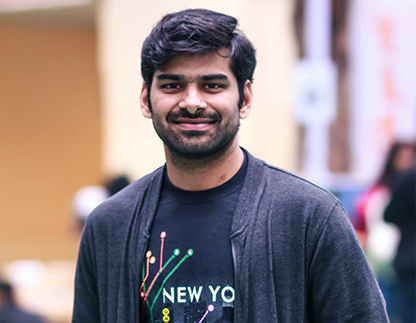Being at Northwestern as a postdoc is like a dream come true to me because of its dynamic research programs and the collaborative opportunities that it creates for research scholars.”
Sai Phani Kumar Vangala (he/him)
Postdoctoral Fellow in Chemical and Biological Engineering

Sai Phani Kumar Vangala is a postdoctoral fellow in Chemical and Biological Engineering in the McCormick School of Engineering. His postdoctoral research focuses on Chemical Recycling to Monomers (CRM) using techniques from computational and Quantum chemistry. Sai Phani uses Metadynamics, Generic force fields MD (GFN-FF MD), and Quantum Chemical computations (DFT) to forecast the thermodynamics and kinetics of polymer processes in order to build recyclable polymers by thermolysis.
How would you describe your research and/or work to a non-academic audience?
Polymers are indispensable in our daily lives, and we use polymers (i.e., plastics) for food packaging, containers, furniture, electronic applications, and many other things. But after the end of their useful lives, they eventually end up in landfills or the oceans thereby creating enormous environmental pollution. So, to address the challenges of plastic pollution, we need to intelligently develop the sustainable polymers that can be recycled back to their monomeric form after the end of their useful lives by means of Chemical Recycling to Monomers (CRM). I am currently working on developing a Computational Model that could lead to the prediction of structure-thermodynamic properties of renewable polymers that can be recycled back to their monomer state once they exhibit the desired properties, and my computational predictions would be further useful to guide experimentalists for the synthesis and development of such Circular Polymers.
What have been some of the most memorable twists and turns of your career?
My career so far has been very challenging with multiple twists and turns. I rejected a couple of job offers prior to completing my PhD in "Computational Design of Materials for Catalytic, Electrochemical and Biochemical applications." Although I was literally new to computational research, after spending almost five years working tirelessly on computations, I finally landed at Northwestern University. I never expected as a postdoc that I would work on such interdisciplinary and collaborative research on the computational design of circular polymers after getting a PhD in the computational design of catalysts. It's a big turn in my research career because of the shift in focus, but I feel excited to pursue different research directions.
Whom do you admire in your field and otherwise, and why?
I always admire my mentors for their encouragement and guidance throughout my academic journey and for shaping me into what I am today.
What do you find both rewarding and challenging about your research and/or work?
In the realm of computational design of circular polymers, there is no universal computational model that could be useful to predict the structure-thermodynamic properties of a diverse class of polymers. It has been very challenging to work on developing a robust computational method that could result in an accurate prediction of the properties of a polymeric material. I feel very rewarded and satisfied whenever we predict some property of a material that has not been predicted by anybody else. That motivates me to continuously work on such challenging problems in the research.
What is the biggest potential impact or implication of your work?
As I mentioned earlier, we are in dire need of developing sustainable technologies to replace and recycle the current polymeric systems. To address the polymer recycling issues, it is very important to have a robust computational tool that can quickly provide scientific insights about a particular polymer instead of repeating expensive experiments to test the polymer.
Why Northwestern?
Being at Northwestern as a postdoc is like a dream come true to me because of its dynamic research programs and the collaborative opportunities that it creates for research scholars.
Tell us about a current achievement or something you're working on that excites you.
I was elected as Treasurer of the Northwestern University Postdoctoral Association (NUPA) consecutively for the second time in June 2022, and I have been a part of NUPA’s Professional Development Subcommittee for the past 1.5 years. I plan professional development events for the postdoc community at Northwestern, and I am very fortunate to work with NUPA and the Office of Postdoctoral Affairs (OPA).
Tell us about a time when things did not go as you planned, what did you learn?
I graduated with my PhD in January 2020, and I had a couple postdoctoral opportunities in my hand at that time. I was very excited to start my new postdoctoral career right after that, but Covid-19 started spreading across the world, most countries imposed travel bans, and visa consulates were closed. I had to stay at home for almost 11 months until I got my U.S. visa in December 2020. The 11 months that I stayed at home unemployed were really a frustrating time for me, and I thought of changing my career toward industry. But somehow it taught me to be patient enough to achieve some great things in life. The great thing in my life was becoming a postdoc at Northwestern University.
Published: March 28, 2023
If you know a graduate student, postdoctoral trainee, graduate faculty member, staff member, or a member of our TGS alumni population who would make a great candidate for our TGS Spotlight Series, please complete this brief TGS Spotlight Series Nomination Form.